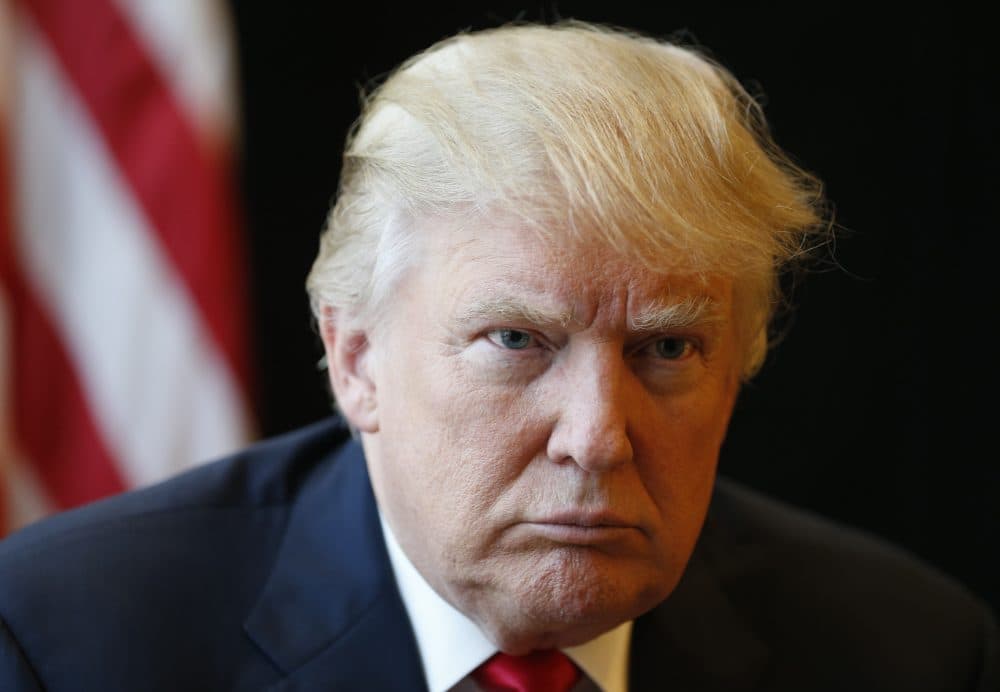Advertisement
Commentary: The Electoral Landscape Has Shifted, But Trump Hasn't

After a terrible June, Donald Trump has seen that the ground has shifted under him; what worked in the primaries no longer applies. He is behaving in ways that are at least undisciplined and at worst self-destructive. His tiny staff, dominated by him and a fraction of the size of Hillary Clinton’s, is unable to keep up with the demands of a general election campaign. He can’t count solely on tons of “free media” (press coverage). In a general election you need advertising. There isn’t a contest or debate coming every week or month; instead there are relentless polls, often several each week.
In seven swing states, Clinton, by margins ranging from 4 to 17 percentage points, now leads the man who carries poll results around in his pocket, according to a recent poll. Almost as bad, he never counted on his second favorite target, President Obama, getting job approval ratings that are steady or improving.
Trump had to be assuming that “Crooked” Hillary Clinton would be indicted for misuse of her emails. When she wasn’t, he went on a televised rampage, claiming a deal had been cut between Attorney General Loretta Lynch and Clinton. “It’s a bribe,” he literally screamed, referring to Clinton’s saying she might keep Lynch in her current post if she’s president. “It’s a bribe!” he screamed again. It was the first nationally televised temper tantrum of this election season — “It’s a bribe!” His usually supportive crowd was stunned into silence.
He believed GOP fat-cats would finance his general election campaign; they haven’t. He has finally started raising money, but in June Clinton’s campaign and her allies spent $45 million on TV commercials in key states. Trump and the National Rifle Association spent $3 million -- a whopping 15-1 advantage for the Democrats.
Instead of bashing party leaders as he did in the primaries, he now needs them. Yet, at a “unity” meeting with Republican senators last week, Trump brought a sledgehammer. He got into an argument with Sen. Jeff Flake of Arizona over how Trump had dissed his home-state colleague, Sen. John McCain, saying he wasn’t a war hero. Nebraska Sen. Ben Sasse, who in February (!) wrote on Facebook that he cannot support Trump, left the meeting believing, as a spokesperson said, the race is “still a dumpster fire.” For good measure, Trump attacked an absent Sen. Mark Kirk of Illinois who had withdrawn his endorsement, to which Trump boasted that he’d win Illinois anyway. All in all, it was a calamity -- coming 10 days before the Republican convention, which has already got party leaders sweating.
He never expected the uproar over his Twitter attack on Clinton using a six-pointed star often associated with the Jewish faith -- the Star of David. It looks almost identical to a neo-Nazi outfit’s Twitter attack on Clinton; the design and color are exactly the same. Trump went on a verbal tirade claiming it was “just a star.” In the primaries, if he got heat for saying or doing something outrageous, he’d move on to a new topic. This time, he kept the star story alive for days.
In the wake of the murders in Orlando he cited invisible praise for “predicting” it; the New Republic called his self-praise “a ghoulish victory lap.” It noted, “The boisterous belligerence and self-aggrandizement that helped him win the primary won’t serve him just as well in the general election.”
Trump probably hoped Sens. Bob Corker of Tennessee or Joni Ernst of Iowa would seriously consider becoming his vice presidential candidate. They didn’t. Jeff Sessions, senator from Alabama, the only senator to endorse him in the primaries, is either on the short list or not interested, depending on who’s talking. Trump probably believed Sen. “Little” Marco Rubio of Florida would keep his word and attend the convention and help him. Rubio suddenly slammed it into reverse and said he won’t be in Cleveland after all.
His best known vice presidential prospects have dwindled to two blowhards who often get into trouble for intemperate remarks and a fondness for attacking the press. Newt Gingrich, former speaker of the U.S. House, was forced to resign the leadership by his colleagues in 1999 and in 2012 had a 25 percent favorable -- and 60 percent unfavorable — rating when pollsters last asked about him when he ran for president.
The other name often mentioned is New Jersey Gov. Chris Christie, who is spectacularly unpopular in his home state, 26 percent favorable, 62 percent unfavorable, according to a poll done in late May. He’s so unpopular, almost one-half of New Jerseyans say they dislike everything about Christie.
Another possible VP has surfaced, Gov. Mike Pence of Indiana, a favorite of evangelicals; but his standing has fallen (35 percent favorable, 38 percent unfavorable) for signing a bill on “religious freedom” that was seen as sanctioning discrimination. Suddenly floated one week before the convention was retired Lt. Gen. Michael Flynn, a little known figure but outspoken critic of Clinton.
Since June, Trump hasn’t been able to monopolize center stage with boisterous, unscripted rallies; use debates to belittle opponents; score points on Twitter without response from opponents; count on cable TV simply to record his bombasts without checking his accuracy; or get away unchallenged by saying without proof, “A lot of people say…”
It’s the playoffs, Donald, and you have to bring your A game.
